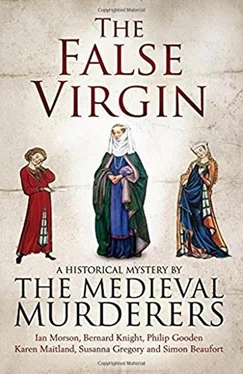He went down the nearest flight of steps until he reached the terrace where Philippa and her friend were strolling. Except that they were no longer together. Coming towards him along the walk between trees and shrubs was the well-dressed individual. He was handsome with a neatly cut beard. Definitely not English, and so probably part of the Castilian company. He was moving rapidly and scarcely looked at Chaucer as he passed. At the far end of the walk Philippa was standing motionless.
Geoffrey went towards her. When he was close enough, he called her name and raised his hand slightly in greeting. She did not smile as her sister had done. She looked neither pleased nor displeased to see him. Instead she looked preoccupied. Perhaps it was something the Castilian had said to her. Chaucer didn’t ask. He gave no indication that he had been watching her, let alone asking who it was she had been walking with.
Philippa and Geoffrey Chaucer talked cordially enough. He asked about the children. She asked what he had been doing at Bermondsey Priory. He explained that he had encountered the Duke of Lancaster and Katherine in Philippa’s chamber. And so on…
If Geoffrey had turned and followed the Castilian instead of going on to speak to his wife, he might have discovered something more interesting, even worrying. Carlos de Flores was walking fast because he had suddenly remembered that he was due to meet someone. It was the same sound of the noon-day clock bell that Geoffrey heard that prompted him to leave Philippa in a hurry. He walked up the gardens on a diagonal slant and then through the palace. Much of the Savoy was still a maze to him although he was familiar with parts of it, such as the route to the stables. Waiting for him in a shaded corner of the large, high-walled yard was the red-capped individual whom Chaucer had encountered in the Tabard Inn. No courtesies were exchanged between the two men, they fell to talking straight away. Anyone observing the two – the Castilian and the Londoner – would have realised that they had business together, and that something about their postures suggested that it was confidential.
The red-cap did most of the talking, while de Flores nodded from time to time. Then they must surely have had some sort of disagreement for red-cap started to raise his voice, as he had in the tavern. There was no one about, only some liveried grooms keeping to the sunny side of the great yard, but the foreigner put his hand on the other’s shoulder, to soothe him or control him. The hand was angrily shrugged off and red-cap stalked away with that stiff gait that Chaucer had already observed. He went off in the direction of the gate on the Strand. De Flores stared after him for a while before retracing his steps to the more refined area of the palace.
Yet this meeting had not gone unobserved. A woman had been keeping a distant eye on de Flores for the last half-hour or more. She had already witnessed his deliberate encounter in the gardens with Philippa Chaucer and his abrupt departure from her. The expression on her face as she saw the Castilian and the Englishwoman was not difficult to read. It was one of anger. She scurried to keep up with Carlos de Flores as he strode through the palace and then, keeping in the shadows, she watched the Castilian meet the man with the red cap. She had distinctive features, this woman in the shadows: a hawk-like nose, black eyes, a smile that could quickly be replaced with an angry baring of the teeth. But it would have been difficult to interpret her reaction to what she had been watching for the last few minutes, Carlos de Flores in conversation with a red-capped man. Neither pleasure or displeasure, but curiosity perhaps.
So things went on quietly enough for a couple of months. Spring turned into summer. Philippa Chaucer continued her sojourn at the Savoy Palace. Geoffrey spent most of his time at Aldgate and at Wool Wharf, down by the river, attending to his duties as Controller of Customs. But things were not so quiet for Geoffrey’s patron, John of Gaunt. With the King’s oldest son, Edward, close to death and the King himself in a decline that was scarcely less steep, John was forced to attend Parliament to hear charges that the King was burdening his people with too much tax, and – although these accusations weren’t made so explicitly – that the money raised was being wasted or used for corrupt purposes. Geoffrey Chaucer heard from Philippa and other insiders reports of Gaunt’s fury at the insolence of the Commons. Yet however much Gaunt might storm and vow to crush the upstarts, for the moment the tide of events was against him and his family, and so he was compelled to make concessions.
It was perhaps for the sake of diversion from all these troubles that Geoffrey was encouraged to recite his latest work, the story of St Beornwyn, to the cream of the Savoy court.
Thomas Banks himself passed on the word. ‘My master – our master – would be glad to hear your tale of the saint and the butterflies,’ he said. The steward was obviously in the confidence of the Duke of Lancaster. Perhaps there was more to him than there appeared.
Chaucer visited the St Paul’s copier to whom he had entrusted his original script and, after paying the two marks agreed on, he received three copies in return. Back in Aldgate, he checked through the manuscripts for accuracy. They were neat and clean, though in no way decorated or ornate. Geoffrey remained pleased with his invention in the story of St Beornwyn, the way he had subtly cast doubt on the truth of the legend. Now he intended to send two of the copies to the palace in advance of his public reading. It helped if a handful of his audience was familiar with what he was about to say. It was like seeding the ground in the hope of a good crop of applause and praise.
Late one sunny morning a couple of days afterwards, Chaucer was returning from his office at Wool Wharf. His head was full not only of wool but of wine, or rather the columns of figures, weights, bales, tuns, shipping rosters and commissions that made up most of his reading at work. It was only as he got to the front door of his Aldgate lodgings that he noticed, to his surprise, that the door was ajar. This was unusual because the flow of traffic through the nearby gate, which was the principal route in and out of this eastern part of the city, made it unwise to leave the place open or unguarded. Geoffrey pushed at the door. Inside was a sparsely furnished lobby, with one spiral flight of steps leading up to Geoffrey’s set of rooms, which straddled the gate itself, and another, smaller flight going straight down to a cellar. The only illumination came through a narrow, barred slit in the stone wall beside the front door. But now, by the sunlight streaming in from the street, Chaucer saw Joan bending over a diminutive figure who was slouched on a bench against the wall.
To his alarm, he realised that it was young Thomas. His mother was using a cloth to try to stanch blood dripping from the lad’s head. Alerted by the sound of the door and the increase of light, Joan looked round. The fear on her lined face was replaced by relief.
‘Thank God it is you, sir.’
‘What’s happened? Is he all right?’
The boy himself raised one hand slightly in response but said nothing.
‘I need to get water and a poultice.’
‘Go on, Joan. I’ll stay and look after him.’
Geoffrey took the sodden cloth and kept it pressed against the boy’s forehead. With his other hand he cradled the back of Thomas’s head. It did not appear that much damage had been done, only a nasty though superficial gash producing blood that was already flowing less freely. Joan disappeared up the spiral stairs. Chaucer made reassuring sounds to Thomas. He was fond of the lad. He allowed him to call him Geoffrey. He thought that he probably saw more of this Thomas than of his own son. He glanced round. The door was still half open. From the street came the rumble of carts and carriages and the constant shuffle of pedestrians converging on the gate. Chaucer wondered what had happened.
Читать дальше












